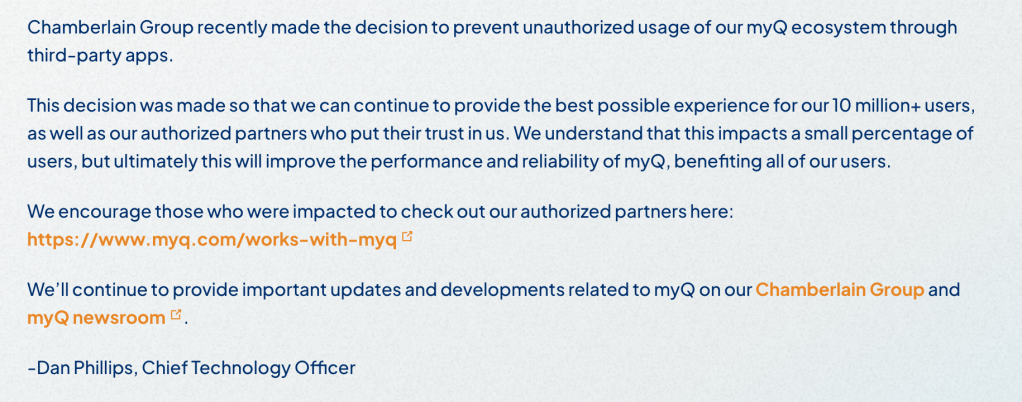One more thing about wifi garage doors

For the last ten years, I've been a big fan of wifi garage doors because you don't have to carry an extra key or controller and you can automate things once the garage opens (like turn on lights in your house).
I've had Chamberlain/LiftMaster doors for years now in two different houses and though I've famously had them hiccup every so often, for the most part they're reliable and trustworthy and good to have around.
Last month, I noticed my automations where the overhead lights in my garage come on when you open the door stopped working. I chalked it up to a temporary problem at first, but after a week I started double checking my home server and updating every package to make sure it wasn't my fault. When the lights still didn't work I checked my logs and found myself cut out of the Chamberlain/LiftMaster API used to control the garage from other devices.
The error said I had issued too many requests, and that I needed to stop for 60-90min and try again. So I did that, shutting down my HOOBs bridge to the API for the night, then reconnected in the morning. Instantly, I got the same errors. Hmm.
I scoured reddit to see if other people were having trouble and found discussions about this exact thing. From reddit I found out the CTO of Chamberlain/LiftMaster published an open letter saying "unauthorized" access to their API was cut off and they were only going to work with paid partnerships.

How things worked before
Chamberlain/LiftMaster garage door openers don't require the use of a hub on your local network, instead they report up to the cloud where the Chamberlain/LiftMaster API resides. If you use the "My Q" app made by their company, it logs you in with an account, shows you the status of your garage doors and lets you open and close them with a quick tap. It's not instant, and takes anywhere from 5 to 20 seconds to actually open your door.
Eventually, Chamberlain/LiftMaster built a HomeKit hub to let you talk to your garage doors with the Apple Home app on iPhones and Macs. But then some tinkering nerds figured out they could code up a fake My Q client that logs in as you and checks the door status, offers an open/close button and is also HomeKit-available in a homebridge My Q app.
That homebridge app worked perfectly for years, but I could tell it was a strange app. Whenever I ran analytics on my home network, I'd see requests to the My Q API on the order of two to three thousands of times per day. I believe the code logged in as you and checked your garage door statuses every few seconds. I kind of wish it could have been once every 30 seconds but then there would be a long lag between when you push the button on your phone to open the garage, and automations would be delayed by up to 30 seconds.
I noticed the official My Q app has been launching new monthly fees for integrations between the garage door and other services/apps, so I figured someday they'd probably shut down access to the API.
The solution
Chamberlain/LiftMaster says if you want to continue using Siri to open your doors you should buy their HomeKit hub/add-on box, but they stopped selling it last year so now the remaining boxes fetch up to $300 on eBay (original price was about $60).
I searched YouTube for solutions and saw a few people figured out ways to keep your garage doors on your HomeKit network. One of them kept mentioning a small piece of hardware called a "RATGDO".
I'd never heard of this so I had to look it up—it's an acronym that stands for: Rage Against The Garage Door Owners
It's a bit of code and some simple network hardware you plug into your garage opener. It's basically a hub that lets your devices check the status of your doors without having to contact the cloud, so you can continue using automations and Siri and opening/closing your doors from your phone.
I don't know if I'm going to go down the RATGDO route, since it's a bunch of hardware and wiring and will take up a whole Saturday to get working. For now, I'm going back to the HomeKit hub/box I still have to see if that fixes things back up.
It's annoying though to have the rug pulled out from everyone using the old software method of interacting, and with no warning it was going to happen. On the one hand, I get that thousands of requests per day from a small percentage of customers could easily be 50% of their entire network traffic, I just wish they gave the authors of the software a way to decrease the frequency instead of blocking everyone. Chamberlain/LiftMaster has a legit reason to believe past customers giving them no new money are costing them money, but then again I may never buy another garage door opener from them again based on how they rolled this out.
Subscribe to our newsletter.
Be the first to know - subscribe today





